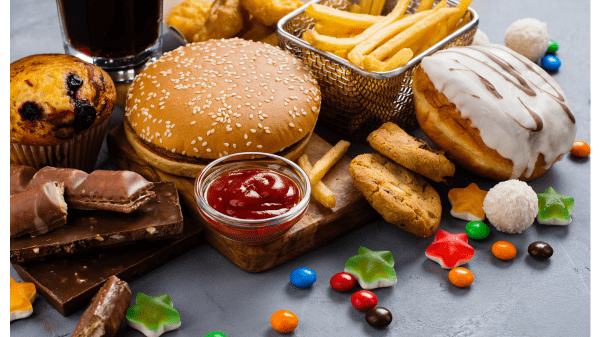Just 4 Days of Junk Food Can Rewire Your Brain – The Shocking Truth

Introduction:
When most people think about junk food, they picture greasy burgers, crispy fries, or sugary sodas and assume the biggest danger is weight gain or poor digestion. However, groundbreaking research has revealed a far more alarming truth: eating junk food for as little as four consecutive days can begin to rewire your brain, altering the way you think, feel, and make decisions about food. This revelation shakes up the long-standing belief that poor eating habits only harm us in the long run. The reality is that your brain may start to change almost immediately—and not in your favor.
This article explores the scientific evidence, the biological mechanisms, and the real-life consequences of short-term junk food consumption on the brain. More importantly, we will discuss how to break free from these neurological traps before they spiral into lifelong unhealthy habits.
The Science Behind Food and the Brain
Our brains are wired to seek pleasure and avoid pain, and food plays a central role in this process. Eating enough protein releases dopamine, the brain’s “reward” neurotransmitter. In evolutionary terms, this system ensured that humans were motivated to eat calorie-dense foods for survival.
But in the modern world, where processed foods are engineered with hyper-palatable combinations of sugar, fat, and salt, this system can be hijacked. Junk food creates an intense dopamine spike that rivals or even surpasses natural rewards, making the brain crave more.
In other words, your brain starts to treat junk food like an addictive substance. And shockingly, research suggests this rewiring can start within just four days.
The Landmark Study: Four Days is Enough
In a pivotal study conducted by researchers at Yale University and the University of New South Wales, participants were fed a high-fat, high-sugar diet for only four days. The results were astonishing:
- After just four days, participants showed impaired hippocampal function, the part of the brain responsible for learning and memory.
- Their ability to control food choices weakened, leading them to prefer unhealthy snacks even when they weren’t hungry.
- Brain scans revealed that their reward pathways became hypersensitive to junk food cues, meaning their brains lit up more strongly when they saw or smelled unhealthy foods.
The implication is clear: it doesn’t take months or years of poor diet to damage your mental health—it can start within a single week.
How Junk Food Hijacks Your Brain
1. Dopamine Overload
Every bite of pizza, burger, or Dark chocolate bar triggers a dopamine release. When this happens repeatedly in a short period, your brain’s reward system becomes desensitized. As a result, you need more junk food to feel the same level of pleasure—similar to drug addiction.
2. Weakened Memory and Learning
The hippocampus, crucial for memory and decision-making, becomes less effective when bombarded with processed foods. This makes it harder to remember health goals, resist cravings, or make rational decisions about eating.
3. Impaired Self-Control
The prefrontal cortex—the brain’s control center—struggles when overwhelmed by dopamine spikes. This weakens willpower and makes it harder to resist cravings, even if you know junk food is harmful.
4. Mood Swings and Anxiety
Junk food consumption alters neurotransmitter balance, leading to mood instability, irritability, and anxiety. It creates a vicious cycle where negative moods drive you to seek comfort in more junk food.
Real-Life Consequences of Four Days of Junk Food
While the science is compelling, the consequences are even more relatable. Imagine this scenario:
- Day 1: You indulge in fast food for lunch, soda in the afternoon, and ice cream at night.
- Day 2: You wake up sluggish but crave a donut or pastry.
- Day 3: You feel more irritable, less focused at work, and start snacking unconsciously.
- Day 4: You’ve lost track of your healthy eating goals, and your brain is already primed to choose fries over salad without hesitation.
This isn’t just a matter of willpower—your brain has already been rewired to favor unhealthy choices.
Why Short-Term Damage Matters
Some might argue, “It’s only four days; what’s the big deal?” The problem is that these early changes can set the stage for long-term habits. Once your brain starts favoring junk food, breaking the cycle becomes significantly harder. Short-term indulgence can easily spiral into chronic poor eating patterns, leading to obesity, type 2 diabetes, cardiovascular disease, and even cognitive decline.
The Broader Health Impact Beyond the Brain
Although this article focuses on the brain, it’s important to remember that short-term junk food binges also wreak havoc on the rest of the body:
- Blood sugar spikes lead to energy crashes.
- Inflammation increases, straining the immune system.
- Gut bacteria balance is disrupted, which further affects mood and cognition.
- Sleep quality deteriorates, compounding the brain’s vulnerability.
The brain-body connection means that changes in one system quickly ripple across the entire organism.
Junk Food and Addiction: The Parallels
The similarities between junk food and addictive drugs are uncanny. Both:
- Provide an intense, short-lived pleasure.
- Alter brain chemistry in ways that promote compulsive use.
- Create withdrawal symptoms when reduced or eliminated.
Neuroscientists have observed that people hooked on processed foods often exhibit similar brain activity patterns to those addicted to nicotine or cocaine. This explains why simply telling someone to “just eat healthy” rarely works.
Breaking Free: How to Rewire Your Brain Back
The good news is that the brain is remarkably adaptable. Just as four days of junk food can rewire it in harmful ways, conscious healthy choices can help restore balance. Here’s how:
1. Reboot with Whole Foods
Focus on nutrient-dense foods like fruits, vegetables, lean proteins, and whole grains. These restore neurotransmitter balance and retrain your brain to enjoy natural flavors.
2. Hydration First
Often, cravings are worsened by dehydration. Drinking water before meals can help reduce the brain’s false signals of hunger.
3. Mindful Eating
Slow down and savor each bite. This practice strengthens the brain’s connection to satiety signals and reduces compulsive eating.
4. Limit Dopamine Spikes
Avoid pairing sugar with fat in large amounts, as this combo creates the strongest addictive response. Opt for balanced meals instead.
5. Exercise for Brain Health
Physical activity boosts blood flow to the brain, improves hippocampal function, and helps regulate dopamine levels.
6. Prioritize Sleep
Sleep deprivation amplifies cravings by disrupting hormones like leptin and ghrelin. Adequate rest strengthens self-control.
A Cultural Wake-Up Call
The revelation that just four days of junk food can alter brain wiring isn’t just a personal health issue—it’s a societal one. In many countries, children are exposed to fast food multiple times a week, sometimes daily. If young brains are this vulnerable, the public health implications are enormous. Early exposure to junk food could be programming future generations for a lifetime of unhealthy eating habits.
Governments, schools, and families must take this science seriously. Public awareness campaigns, restrictions on junk food advertising to children, and policies promoting affordable healthy food options are urgently needed.
Myths vs. Reality
- Myth: “Junk food only makes you fat over time.”
Reality: It alters your brain function in just days. - Myth: “I can eat whatever I want as long as I exercise.”
Reality: Exercise helps, but it doesn’t reverse the neurological impact of junk food. - Myth: “Short-term indulgence is harmless.”
Reality: Even brief exposure can rewire your cravings and weaken self-control.
Long-Term Implications: From Cravings to Cognitive Decline
Scientists warn that if short-term junk food consumption impairs memory and decision-making, chronic consumption could increase the risk of Alzheimer’s disease and dementia. Studies show that diets high in saturated fat and sugar accelerate brain aging and reduce synaptic plasticity—the brain’s ability to adapt and form new connections.
This means today’s junk food habits may directly shape tomorrow’s mental health outcomes.
Practical Tips for Everyday Life
- Plan Ahead: Keep healthy snacks like nuts or fruit readily available to reduce impulsive junk food choices.
- Cook at Home: Preparing meals lets you control ingredients and avoid hidden sugars or fats.
- Read Labels: Watch out for sneaky additives like high-fructose corn syrup or hydrogenated oils.
- Set Short Goals: Challenge yourself with a “4-day reset” of whole foods to counteract junk food effects.
- Reward Wisely: Find non-food ways to celebrate, such as walks, hobbies, or relaxation rituals.
Conclusion:
The idea that just four days of junk food can rewire your brain is more than shocking—it’s a wake-up call. What seems like harmless indulgence can quickly snowball into impaired memory, weakened self-control, and heightened cravings.
But knowledge is power. By understanding the brain’s vulnerability, we can make conscious choices to protect it. Whether it’s planning meals, practicing mindful eating, or advocating for healthier food environments, every decision counts.
Your brain is your most valuable asset. Protecting it starts with what you put on your plate—today, tomorrow, and every day after.




